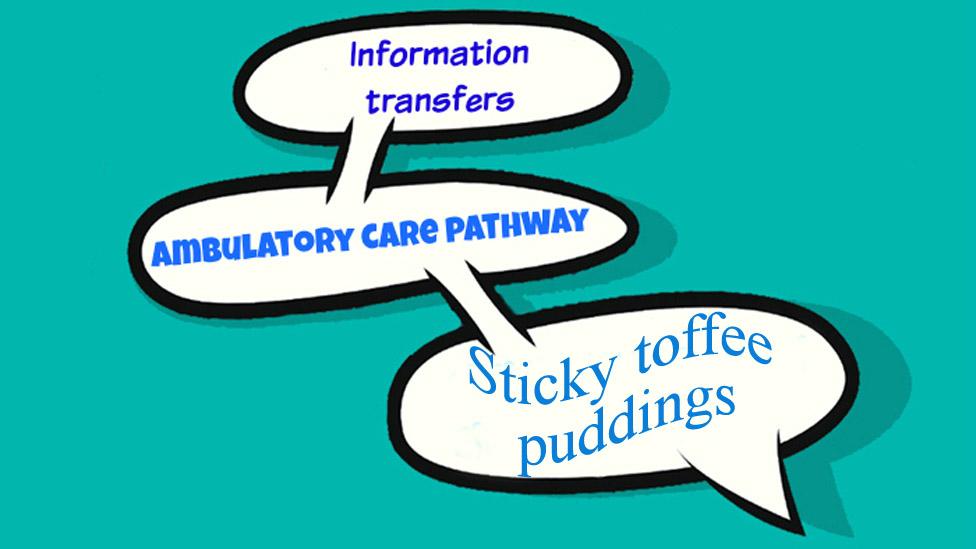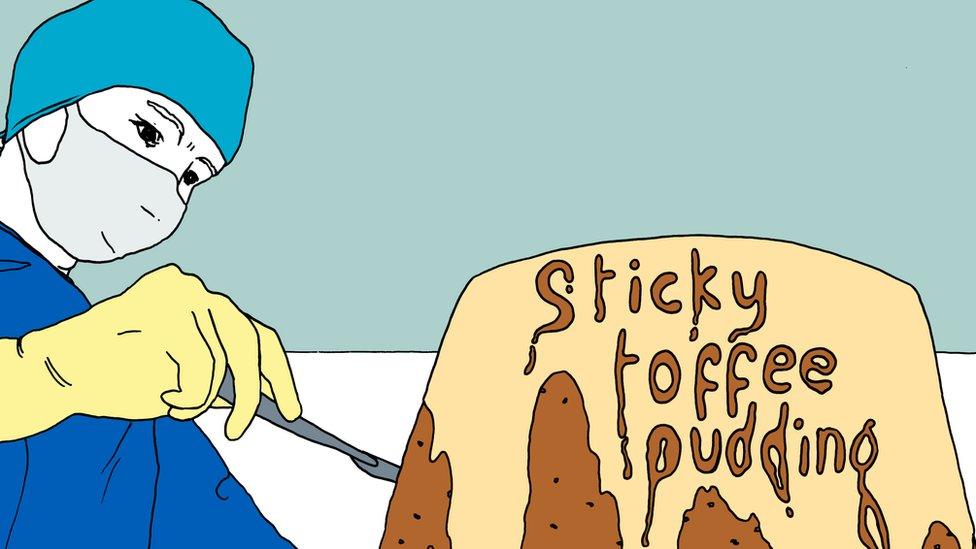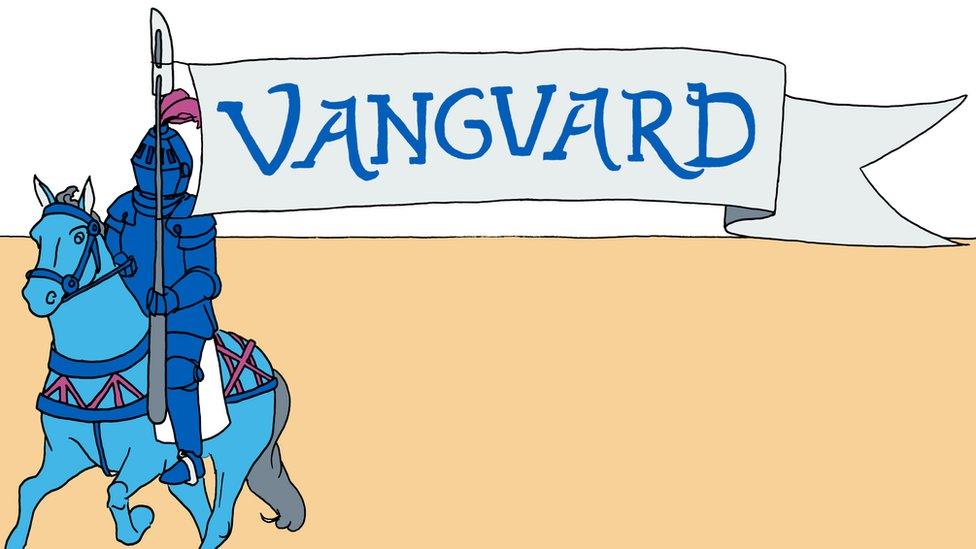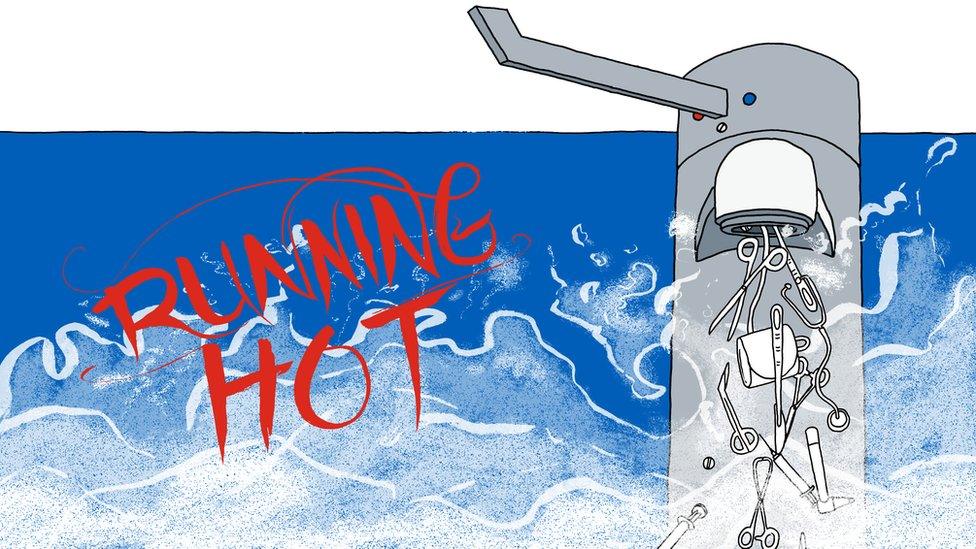NHS confusing public by using 'gobbledygook'
- Published
- comments

Imagine the scene. Up and down the country, local NHS leaders are crowded into meeting rooms discussing information transfers and ambulatory care, when someone jumps up and shouts "I've had enough of sticky toffee puddings".
Confused? You're not the only one. The language being used by the health service is simply gobbledygook, says the Plain English Campaign (PEC).
Steve Jenner, the campaign's spokesman, said the health service was riddled with "jargon" when it comes to explaining anything from the closure of hospital services to major incidents.
And he even believes the NHS may be doing this on purpose.
"If you use impenetrable language it means the public has no clue what is going on. I can't help thinking that suits the NHS sometimes," he said.
"What this jargon is describing is very important. It should be articulated very clearly.
"We expect doctors to clearly explain themselves. It should be the same for the NHS management," he added.
Sticky toffee puddings or important NHS plans?

STPs - dubbed sticky toffee puddings by some in the health service - are among one of the most important developments in the health service in recent years.
They are basically local plans that have the power to re-shape services by closing hospital services and investing in community care.
But you would never guess from the official name - sustainability and transformation plans.
However, the jargon goes further than that, according to the PEC. Look through most plans - there are 44 of them - and you will find some strange phrases.
Cambridgeshire and Peterborough's documents, for example, talk about investing in "system-wide quality improvements" and developing a "shared understanding of all the interrelated issues", while being able to learn "what it means to us as individuals and as organisations".
Meanwhile, documents from North Central London shared the experience of one patient's care that went wrong.
It says due to "hand-offs, inefficiencies and suboptimal advice and information transfers" the "patient's pathway" went on for too long.
Another popular "pathway" is the ambulatory patient pathway. What does that mean? The patient can go home after being seen in hospital.
Is the NHS engaged in a medieval battle?

Vanguards are a term used to describe the formation of a medieval army. But the NHS has also - ahem - deployed the term.
There are 50 vanguards that have been set up to test new ways of running services. They were created in 2015 and include schemes to get hospital doctors working in community clinics and to provide advice via video link-ups as well as the creation of super hubs in the community bringing together GPs, district nurses and council care teams.
You should not be surprised to hear evidence of what works best in the vanguard programmes will then be fed into the STP process.
But it's not just in England where jargon can be found. Northern Ireland's 10-year health strategy, published last autumn, promised to shift the focus from "treatment of periods of acute illness and reactive crisis approaches, towards a model underpinned by a more holistic approach to health and social care".
Or, more simply, try to get people to live more healthily and give them better support to stop them needing hospital care.
Running hot or just busy?

Taps run hot, but so too, it seems, does the NHS. Commentators and health service managers have been using the phrase to describe just how busy hospitals and, in particular, A&Es were this winter.
It may be a bit of an odd phrase, but it is at least easier to understand than Operational Pressures Escalation Level Four.
That is the new name for a black alert - when hospitals get so busy they have to cancel non-emergency operations, divert ambulances and call in extra staff.
And guess what red alerts - the level down from black - were renamed? Yes, that's right, Operational Pressures Escalation Level Three.
Guidance issued by NHS England last year ordered hospitals to use the new terminology when communicating with the public and media.
Not everyone obeyed. Newspaper coverage this winter was littered with reports of black and red alerts.
And what did NHS England make of this? They were unable to provide the BBC with a response.

